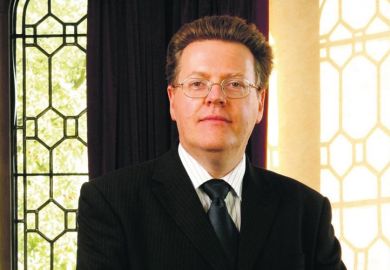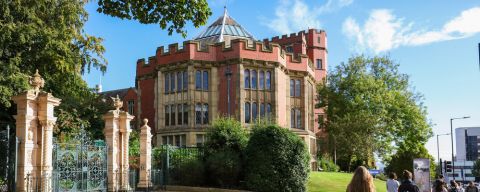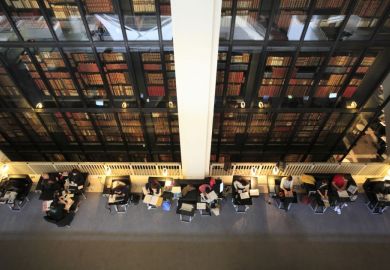“We have to care about each other and our students. We need friendship, to be that much more courteous and peaceful in our interactions.”
What a pathetic and seemingly weak thing that seems to say when there is so much injustice and evil to be fought against. And yet just last week, as I gave my annual talk to university staff, I used just this exact phrase. Why say something so mild, so obvious?
Unfortunately, the context was far from mild. I was trying to explain the dual problem of protecting free speech on campus while preventing anti-Semitism and radicalisation. We have had months of accusations by people quoted in the media, not to mention in both our global and national politics. Symbols of identity or faith that once aroused only curiosity now too often arouse fear. Fears of hate preachers, extremism and worse have led to a point where vice-chancellors like myself now have a personal duty in relation to the prevention of radicalisation.
Related: universities should not just condemn ‘Zionist bashing’
Despite serious doubts (by no less a body than the United Nations) that well-meaning initiatives could themselves be counterproductive, universities now have a statutory duty to vet those who come to speak on the campus. We must assess whether they might inspire enmity against our country, or our way of life, or turn one group against another.
This is our legal responsibility, and we diligently carry it out at increasing cost. But I know we need far more than that if we truly want to preserve our values. My experience of the student community is that the greatest protection they can have against all species of evil, from petty crime to acts of hatred and violence, comes from trust in each other and in those with responsibility for running the university.
I first came to this understanding when I was a warden of a student hall of residence in London more than 20 years ago. I dealt then with a variety of issues in which I needed my students to trust me.
They had to know they could come and talk to me about all aspects of life in the hall. This could be their own personal academic concerns or fears, or their worries that a fellow student was in trouble, or perhaps they might be being bullied or harassed.
I learned over this period that my greatest strength came from their knowing that I would act in their best interests. It took time, of course. They saw me take up their cause if they felt wronged by the academic system. They saw me appear at Horseferry Road Magistrates’ Court if they needed someone to vouch for their good character. They saw me wrangle with the estates department when the roof leaked.
They also saw me talk someone off the roof of the hall in the early hours of the morning. They saw me sort out a problem with the accounts team when a bill went unpaid and there was likely to be no ale in the bar. They saw me outraged and angry if a group of students treated each other, or staff who worked in the hall, with scorn.
And that knowledge of the life my young family and I shared with them is what built their trust. I did care about them, and most of them knew that. Not all of them, of course – to some I was merely symbol of power and authority over them. But the decent ones saw me use that power as I should, to protect them and our shared community.
On leaving Imperial College London for the University of Oxford, I not only treasured the clock I was given but also the honour of being awarded “Social Colours” by those students – a gesture that marked a special relationship of trust in the life of that temporary but vital community.
Now I see our students in Sheffield, along with other student communities around the country, raw from things said by those who want to stir up hatred, and who care little for their well-being and harmony. So as someone once again entrusted to care for a community, I think about how I can do my best to protect them against the evils of racism, anti-Semitism, intolerance, Islamophobia. This is about far more than free speech.
This is why I thought it mattered in my address to our university staff to face up to a subject that vice-chancellors often avoid in such forums, and to talk honestly about how tough a task this is, and what we really need if we are going to come through this time intact. I wanted to explain my belief that our main power against the troubles that assail us comes from trust.
To my relief, staff responded to these reflections in ways that let me know they saw this need, too.
It is, in fact, the natural instinct of the teacher to care for a student’s development. One of our professors, for example, was late for this same talk because she was dealing with a student crisis. She apologised later, but she didn’t need to. She was already on the job of building more of the trust that has made her such a deeply respected academic and tutor.
A university is far more than a collection of buildings, laboratories and libraries. These places are where the true university, which is made up of people, lives and breathes.
The noted teacher and late Jewish leader Rebbe Menachem Mendel Schneerson was once greeted by a man who said that he had come to see him to understand Judaism better. Rebbe touched his shirt over his heart and said that he did not need to find a literal place of spiritual understanding, he needed to find the core of his religion in his own heart.
And that is what I tried to say to our staff. Our own hearts are the key to our greatest challenges. Their diligence as teachers and their empathy as human beings are what reach out to another generation in a community that is built around the ideal of understanding.
These actions will be what translates between languages and culture, what spans all religions and none, to address what Einstein described as our need “to widen our circle of compassion”.
Sir Keith Burnett is vice-chancellor of the University of Sheffield.
Register to continue
Why register?
- Registration is free and only takes a moment
- Once registered, you can read 3 articles a month
- Sign up for our newsletter
Subscribe
Or subscribe for unlimited access to:
- Unlimited access to news, views, insights & reviews
- Digital editions
- Digital access to THE’s university and college rankings analysis
Already registered or a current subscriber?










